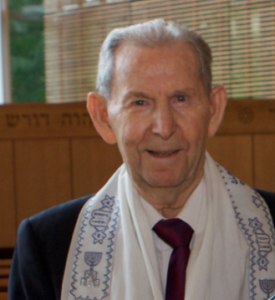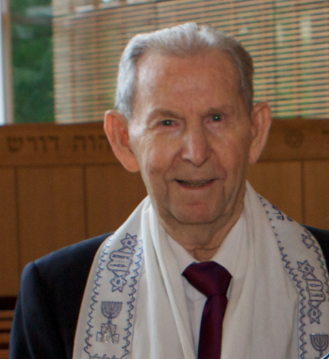
Israel Gajer b. 1925 d. 2018
Israel (“Izzy”) was the third oldest of seven children (2 girls and 5 boys), born into an Orthodox Jewish family in Dubienka, Poland. His father was a tailor. The Gajer family managed their way to the Soviet side of the Ribbentrop/Molotov line dividing Poland in two, and as “Stalin Jews”, subsequently deported into a Siberian displacement camp in 1940. Conditions in the camp were harsh, food and other goods hard to come by. However, in August 1941 a general amnesty was granted to all the displaced Poles – Jews and non-Jews – as hostilities between Germany and the Soviet Union erupted. Granted this measure of freedom to travel in the hinterlands of the USSR in August 1941, Izzy and his family resettled in Tashkent, in Central Asia, along with many of the displaced Stalin Jews.
At 16 years of age by then, Izzy established himself as a resourceful young man in Tashkent, smuggling tea and other products into neighboring towns. A frequent technique was to charm the girl at the local Post Office, who would look the other way when his contraband packages arrived to be picked up for resale; when the girl wasn’t there one day, he was smart enough to stay away, sensing a setup by the local authorities. The Gajer family was also able to practice Judaism more freely in Tashkent, including observing the Sabbath.
After the war, Izzy and his family returned to Lodz, Poland, but due to hostility among the local Polish population soon moved to a displaced persons camp in Germany. Izzy went to school there, training to be a dental technician. Though three of his siblings made Aliyah, Izzy and the rest of his family were granted permission to emigrate to the United States, arriving in 1950. He met Malvina Fisch, and soon married her in 1951.
Izzy and Malvina were reluctant to tell their stories to their family, only doing so more openly after their son attended a gathering of Survivors in Jerusalem in 1981. Speaking of growing up, Andrea Nadai noted, “Our parents were different – they tried to Americanize, but they had a backstory others didn’t have.”
We are grateful they were able to overcome their early reticence to share their story, so we can all rejoice in their triumph in the face of adversity.


